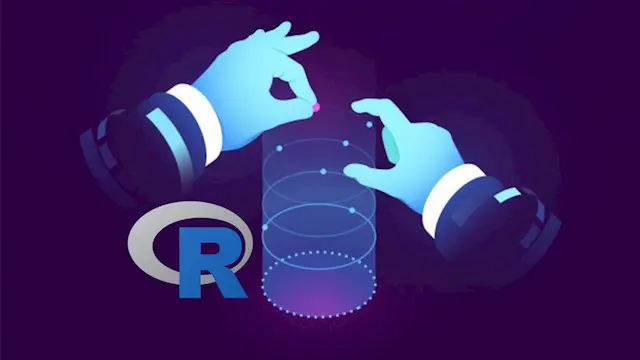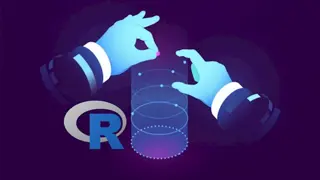
Data Science with R Course
Self-paced videos, Lifetime access, Study material, Certification prep, Technical support, Course Completion Certificate
Uplatz
Summary
- Certificate of completion - Free
- Reed courses certificate of completion - Free
Add to basket or enquire
Overview
Uplatz offers this comprehensive course on Data Science with R. It is a self-paced course consisting of video lectures. You will be awarded Course Completion Certificate at the end of the course.
Data science is a concept that unifies statistics, data analysis, and associated approaches to use data to understand and analyse actual occurrences. Machine learning, classification, cluster analysis, data mining, databases, and visualisation are all sub-domains of Data Science Training, which uses techniques and ideas from a variety of subjects within the wide areas of mathematics, statistics, information science, and computer science. The Data Science with R Certification Course will teach you how to analyse and visualise various data sets, as well as different Machine Learning Algorithms such as K-Means Clustering, Decision Trees, Random Forest, and Naive Bayes.
R is an increasingly popular programming language, particularly in the world of data analysis and data science. You may have even heard people say that it's easy to learn R! But easy is relative. Learning R can be a frustrating challenge if you’re not sure how to approach it.
The Data Science with R course from Uplatz will teach you how to analyse data using the R programming language. This data science with R course will prepare you to apply your Data Science abilities to a range of businesses, allowing you to assist them in analysing data and making better business decisions. This R course includes cutting-edge material and targeted mentorship sessions to help you build job-ready abilities. Enroll in our R training and gain immediate data science knowledge. With the R programming language, data exploration, data visualisation, predictive analytics, and descriptive analytics approaches are covered in the Data Science with R programming certification training. R packages, data import and export, data structures in R, statistical principles, cluster analysis, and forecasting will all be covered.
It explains basic principles without the theoretical mumbo-jumbo and jumps right to the real use cases you'll face as you collect, curate, and analyze the data crucial to the success of your business. You'll apply the R programming language and statistical analysis techniques to carefully explained examples based in marketing, business intelligence, and decision support.
In this Data Science using R course, you’ll learn how this versatile language allows you to import, clean, manipulate, and visualize data—all integral skills for any aspiring data professional or researcher. Through interactive exercises, you’ll get hands-on with some of the most popular R packages, including ggplot2 and tidyverse packages like dplyr and readr.
In this course you will learn Basic R syntax, Foundational R programming concepts such as data types, vectors arithmetic, and indexing and How to perform operations in R including sorting, data wrangling using dplyr, and making plots.
Curriculum
Course media
Description
Course Outcomes
- Comprehensive knowledge of various tools and techniques for Data Transformation
- The ability to do Text Mining and Sentimental analysis on text data, as well as obtain an understanding of Data Visualization and Optimization approaches
- A rigorous involvement of a SME throughout the Data Science Training to learn industry standards and best practices
- Exposure to many real-life industry-based projects that will be executed in RStudio
- Projects that are diverse in nature covering media, healthcare, social media, aviation, and HR
Data Science with R – Course Syllabus
- Installing and updating R libraries
- Navigating RStudio Integrated Development Environment (IDE)
- Understanding different data types working with R
- Reading/storing data from/in different file types
- Applying "tidyverse" tools in data processing
- Transforming data using dplyr functions (select, filter, group by, summarize, mutate)
- Transforming and manipulating strings with stringr package
- Transforming and using different date formats in analysis using lubridate functions
- Applying grammar of graphics with ggplot2
- Creating reproducible analysis as notebooks and reports (html and/or pdf) in Rmarkdown
Who is this course for?
Everyone
Requirements
Passion and determination to achieve your goals!
Career path
- Data Scientist
- Data Analyst
- Data Engineer
- R Programmer
- Software Engineer
- Cloud Engineer
- Machine Learning Engineer
- Data Architect
- Statistician
- Business Analyst
- Data and Analytics Manager
- Business Consultant
- Data Science Engineer
Questions and answers
Currently there are no Q&As for this course. Be the first to ask a question.
Certificates
Certificate of completion
Digital certificate - Included
Course Completion Certificate by Uplatz
Reed courses certificate of completion
Digital certificate - Included
Will be downloadable when all lectures have been completed
Reviews
Currently there are no reviews for this course. Be the first to leave a review.
Legal information
This course is advertised on reed.co.uk by the Course Provider, whose terms and conditions apply. Purchases are made directly from the Course Provider, and as such, content and materials are supplied by the Course Provider directly. Reed is acting as agent and not reseller in relation to this course. Reed's only responsibility is to facilitate your payment for the course. It is your responsibility to review and agree to the Course Provider's terms and conditions and satisfy yourself as to the suitability of the course you intend to purchase. Reed will not have any responsibility for the content of the course and/or associated materials.


